Amarried couple gave birth to a sickle cell child, this generated confusion as it’s believed that none of the parents are carriers, and they even have medical certificates to show for it.
However, after much investigation, it was discovered that the husband was AS. He had conspired with hospital staff at Pantami hospital in Gombe to falsify his genotype prior to the wedding.
“I was frustrated, I badly wanted to terminate my daughter’s marriage because we were betrayed by the husband and the hospital. We spent a lot of money on medication after the child was born,” the frustrated bride’s father told WikkiTimes.

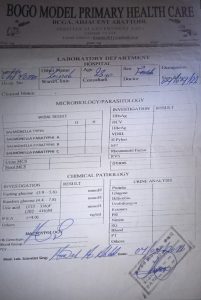
He however said he was prevailed upon to not take the action, “We sat down with my in-laws and I succumbed to damage control since the couples were still in love. But we still live in the fear of the unknown as we don’t know how many more sicklers she would bore”.
There were other instances of such where people present authentic legal documents but with falsified information as such WikkiTimes went to multiple hospitals in Gombe to see how easy it is to obtain falsified medical documents.
EASY PEASY
On July 13, at mid-day, I arrived at Nasarawo Primary Health Care, Nasarawo, Gombe. It wasn’t hard to locate the medical laboratory situated opposite the hospital gate.
Patients waiting in line were scattered around tree shades just outside the laboratory. I proceeded inside the cramped laboratory to get the attention of the laboratory personnel.
A young man clad in a lab coat stepped outside and after exchanging pleasantries, I told him I am a newly recruited banker who is a sickler and I needed a genotype certificate to read AS or AA instead of SS. After listening to my story, without any hint of scepticism he said, “Let me call my Oga, I’m sure he will help you”.
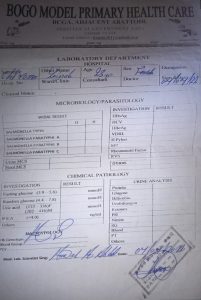
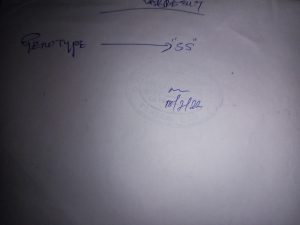
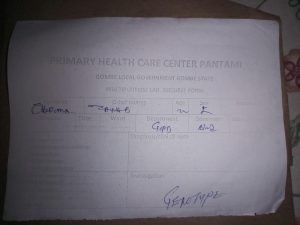
Do they normally get such requests? I thought.
I took a seat on the nearest bench by the lab, next to a woman who kept grumbling to herself about the laboratory’s delay in delivering her test results. One could tell she had been there for quite a while. About 10 minutes later, the same young man reemerged to say to me that his Oga (boss) was observing zuhr prayers and would return shortly.
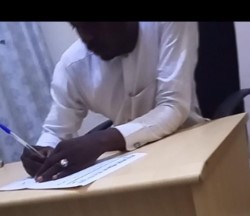
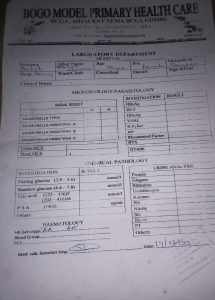
A short while later, another young man appeared, wearing a kaftan, and from the way he swaggered towards the bench, one could tell he was the long-awaited Oga.
He handed the woman beside me her test result; she took her leave, albeit still grumbling.
Left to ourselves, the look on his face told me he had already been informed of my request. Regardless, I recounted my story.
Without hesitation, Shamsuddeen, as I will later find out was his name, said:
“Don’t worry, I’ll get one for you. You know I head the laboratory unit.”
However, his approval was conditioned on the fact that I had to provide evidence of my medical assessment form from the supposed bank I was employed.
“How much will this cost me, yaya na (my elder brother)?” I asked.
He replied, “You have already paid the price by saying yaya na”.
I left with the promise of bringing the medical assessment form the next day.
The next day…
EMPATHY BEFORE ETHICS
As I alighted from the tricycle that dropped me off at Boma Primary Health Care, Nasarawo, the morning air radiated warmth and petrichor that usually come with the wet season. The hospital reception was slightly crowded with waiting patients.

I walked up to the receptionist’s desk and requested to see laboratory personnel. After a short while, a young man approached me after exchanging pleasantries. I asked for privacy, to which we went to an empty office where I made my request of needing a genotype certificate for my work.
Seated behind a table across from me, the young attendant, whom I will la. I will later know to be Saeedu was silent for a moment while lightly tapping the table with his fingers.
“You know, some people fake these things because of marriage, “he said, voicing his concern.
I told him mine is not because of marriage.
This seems to have eased his concerns. He said he would issue me the certificate not before he had spoken at length on why I deserved some sympathy and help to secure this bank job as someone living with sickle cell.
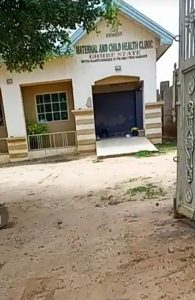
He asked if there would be any other certificate needed for my assessment, he could help me with it.

Laboratory worker filling out fake genotype certificate at Bogo Model Hospital
While filling in the information on the genotype certificate, he kept emphasising why he felt obliged to help me.
Justifications for being unethical or guilty conscience? I wondered.
“I consider you like a sister to me. Please keep this a secret between us,” he said when he handed me the certificate.”
As I left the hospital, I marvelled at the few minutes it took to obtain a falsified genotype certificate reading AS with N2000.

Fake genotype certificate issued at Bogo model hospital.
If Saeedu would always justify his ’empathetic’ actions in this sensitive line of work, how many lives would be ruined in the process? This thought lingered until I made another stop at BCJ Primary Healthcare, where I was the previous day.
NASARAWO PRIMARY HEALTH CARE
Shamsuddeen was fiddling with laboratory tools, probably running some tests, when I knocked at the door. The place was quiet and vacant, unlike the last time I was there. Smiling knowingly, he offered me a seat in a plastic chair, asking me to give him a minute.
He sat across, exhibiting the now familiar air of pride. I handed him a printed paper showing the list of required medical certificates. He stared, mumbled, stared again and finally smiled, nodding his approval.
He immediately stood up, and prepared a genotype certificate that read ‘AS’. This also cost N2000.

Having obtained two certificates that read the same name and genotype group, Zainab Ciroma, Genotype AS, my quest drove me to the outskirts of Gombe town to the gates of Tabra Maternity Clinic two days later.
COVERING TRACKS
The premises of FOMWAN maternity and child health clinic, Tabra, with its neatly trimmed flowers, was being attended to by an elderly woman.

However, the silence that greeted me told me the hospital was also empty of patients and health workers. I greeted the cleaner, who had welcomed me earlier. The lingering stillness had me asking her if this was still a hospital, and she said yes. I walked up to the entrance, and at the reception, I met an elderly woman, whom I would later learn is called Maman Jibril.
Maman Jibrin was a plump, elderly and friendly woman. She quickly offered me a seat, asking how she may help with a receptive smile.
I asked for laboratory personnel and confirmed that she was the only person present. I sat across from her before she offered me a seat, deliberately taking my time to familiarise myself with the vacant room. There were rows of benches before a table where she was seated.
Inquiring why she was the only person present, she said she was also a volunteer and the employed health workers rarely show up.
According to her, the hospital is usually empty, and three doctors have been posted to the hospital at the time of my visit. However, two were transferred elsewhere, and the last one only visits twice a week, sometimes even less.
“Most of the residents seek medical attention elsewhere, but you will always find me here 24 hours a day, “ Maman Jibril said.
After recounting my banking job and sickle cell story, she explained that she has no access to the laboratory, but the doctor who comes once in a while could help me out. She gave me a contact to put a call across, and I left with the promise that if the visiting doctor concedes to my request, it would be keep with her at the hospital, and I could come and get it the following day.
However, several attempts to put a call across the doctor’s number proved abortive, so I returned the following morning.
I was too early, I guess, I thought, as I stepped into the deserted hospital the next morning on Friday. But can one be too ‘early’ to the hospital? I turned the doorknob to the main building and found it locked. I decided to wait for a while, eventually, Maman Jibrin showed up, hurrying towards me with an inquisitive smile. I wondered what she meant earlier when she said she was always present ’24 hours’.
After telling her of my futile attempts to reach the doctor, she called a young man living nearby, who she said helps out at the laboratory sometimes, although not a worker.
He joined us in no time and introduced himself as Abdulsalam. For the umpteenth time, I recited my rehearsed lines. Foremost, he admitted to the legal implications.
“You can easily lose your job if events take turns to expose the certificate as fake,” he said. “But I will talk to someone else, and we will help you. You can come back on Monday for it.”
Monday came, and I appeared early at the gates of Tabra Hospital. I met a different woman, this time a uniformed health worker whose position I could not ascertain.
Possibly a doctor or one in the making. She was attending to two patients while nursing her newborn. This could be the busiest this hospital can get, I speculated. Having tried Abdulsalam’s phone number throughout the weekend to no avail, I asked for Maman Jibril instead.
She showed up moments later wearing her now familiar smile, and when I told her I couldn’t reach the lab guy, she said I could speak to their ‘oga’ directly, pointing to the nursing mother.
I introduced myself again as Zainab Ciroma and the rehearsed line followed suit. She paused, taking her time to digest my narrative. As if on cue, Abdulsalam arrived at the scene, explaining that he couldn’t get it from his ‘oga’ unless I agreed to some conditions.
According to him, the issuer had to be sure that conditions like staying all day in an air-conditioned room would not trigger and expose my sickle cell ailment or the fake certificate that could implicate me. I nodded, assuring them that my health does not falter with extreme weather. That was all it took for them to concede.
The breast-feeding health practitioner, however, first spoke. at length of the legal implications of issuing fake medical certificates and the risk it could bring to the hospital and the health workers.
“For this reason, we’ll not issue one from this hospital. I don’t want it traced back to us someday. But there is a hospital I know that can do it. Come back tomorrow,” she said.
She called the next day to tell me it was ready.
I went to the hospital, and she handed me a folded paper while wishing me the best of luck as I hurried to my awaiting tricycle.
I was curious to know what hospital was willing to issue a falsified document. I unfolded the paper, staring first at the genotype group, which read ‘AA, then at the header, lo and behold! It’s from Bogo Model Primary Health Care, BCGA!

WHEN BIRDS HAVE SICKLE CELLS…
Meanwhile, despite procuring three genotype certificates in a row using the same storyline, I had an idea that sprouted from a conversation I had with laboratory personnel at Gabukka Primary Health Care. The health worker, while adamant at refusing to implicate his job with a fake certificate, offered free tips on getting it elsewhere should I choose to.

Entrance of Pantami Primary Health Care
On July 18, I walked into a pharmacy in the morning and asked the attendant for EDTA containers and syringes. Having purchased that, my next stop was the Gombe new market, layin yan kaji, the chicken abattoir. I bought two syringe of chicken blood. After labelling the EDTA containers and filling them with the chicken blood, I was on my way to Pantami Primary Health care, Gombe.
This was the hospital where the groom obtained a falsified genotype certificate that led to the birth of a sickle cell child.

I made my way to the clinical laboratory in the crowded hospital, where I met several people and young laboratory personnel behind a table attending to patients. I said I wanted to run a genotype test and after paying N600, I presented the chicken blood sample labelled Zainab Ciroma, Genotype test.
I went on to explain that I had earlier visited another hospital to conduct a general blood test, but after drawing out my blood, they informed me they don’t run genotype tests, so I begged them to give me some of the blood samples to run the genotype test elsewhere.
Without questioning my narrative or the blood sample, the young lady took the container, glanced at the label and nodded in approval, not even noticing that I had used the wrong specimen collection tube for the blood sample!
Hours later, I was holding yet again, another certificate, reading Zainab Ciroma, Genotype ‘SS’. Turns out even chickens have sickle cells!


WikkiTimes contacted the hospital authorities and the Medical Science Laboratory Council Of Nigeria, Gombe state chapter, confronting them with the evidence of the investigation.
All hospital spokespersons, however, denied knowing such acts going on in the hospital, promising to sanction the staff involved.
Speaking to Sadiq Usman of Bogo Model primary healthcare, he revealed that Bogo hospital does not even conduct genotype tests as it is not approved in the facility.
He further supported his claims by providing WikkiTimes with a list of the approved list of medical tests carried out in the hospital.
Similarly, the medical officer, FOMWAN clinic Tabra, Abubakar Ya’u Idris, also said Tabra does not run the genotype tests as it is not approved.
On his part, the public relations officer, Gombe state chapter of the medical laboratory science council of Nigeria, Mr Abdulwahab, expressed shock over the findings, saying it is a serious crime against humanity.
“The laboratory council has been doing its best to eliminate such acts. Through advocacy, visitations and frequent conferences, these crimes have been heavily denounced”
“Therefore, any laboratory found guilty of such crime will face serious sanction from the council,” he said.
A veterinary doctor Sani Hamidu Kwairanga spoke on the basic differences and similarities between animal blood and human blood. However, while pointing out that the difference between the blood is not obvious, he said a medical laboratory scientist would be able to tell them apart when running a blood test. The diversity of blood groups in animals, according to him, depends on the species of the animal.
“Blood is a fluid that contains plasma and cells. It has three components; red blood cells, hemoglobin that gives the blood a reddish appearance and white blood cells that act as defence mechanisms. Now, there are three parts of a cell membrane, cytoplasm and nucleus.
Hemoglobin is present in all blood samples. Of the differences, Human red blood cells and other mammals lack nucleus, but poultry red blood cells have nucleus, he explained.
Speaking on the legality of presenting blood samples to hospitals to run tests, Alyasau Zakari, a Medical Laboratory Technician at the Federal Teaching Hospital, Gombe confirmed that it is not legal for hospitals to accept blood samples to run a viral blood investigation.
He, however, explained that blood tests that have minimal implications can be carried out in that manner, including malaria, sugar test, etc as it can hardly be used to harm anyone as opposed to accepting blood samples to run tests like genotype, HIV etc.
“Legally speaking, laboratory personnel found guilty of accepting blood samples to run these sensitive blood investigations can face penalties ranging from being delisted from the professional body of a medical laboratory and having his license seized,“ Zakari explained.
A genotype certificate’s implication is not limited to the medical line alone. Religious institutions have for long recognised its sensitivity, marking it as a requirement for intending couples alongside other health-related assessments.
READ: Bali-Gembu Road Scandal: FG Takes Over Project From Taraba Govt After WikkiTimes Investigation, To Commence Full Reconstruction
The mosque, for example, requires both the man’s and the woman’s genotype certificates as evidence of compatibility before the wedding takes place. However, verifying whether those results are fake or real becomes difficult.
Mallam Abubakar Muhammad, an Imam and religious cleric from Mallam Inna Mosque, Gombe, said: “By saying ‘faking’ “it makes it illegal. In Islam, a prospective husband and wife must meet some conditions before marriage, and one of the conditions is being healthy. So, when they bypass this, the result will bring negative effect on them, or their children and Islam is against it. They should fear Allah and do what is right.
Similarly, Pastor Mrs Yetunde Ogunrinde of Redeemed Christian Church of God, Miracle Parish, Gombe while condemning the act of faking certificates, suggested that religious institutions should emulate scrutiny when it comes to compatibility tests in couples. According to her, churches today prevent foul play by referring intending couples to the church’s own recommended hospitals and after the genotype test, the hospital delivers the sealed results directly to the church.
“The same method applies to other blood tests required for marriage,” she said.
A medical doctor, Abdulmalik Abubakar Dukku noted that “no responsible certified medical personnel would indulge in granting fake certificates whatsoever because the consequences are severe. Most of these people are just hospital employees.”
This publication is produced with support from the Wole Soyinka Centre for Investigative Journalism (WSCIJ) under the Collaborative Media Engagement for Development Inclusivity and Accountability Project (CMEDIA) funded by the MacArthur Foundation
Credit-WikkiTimes




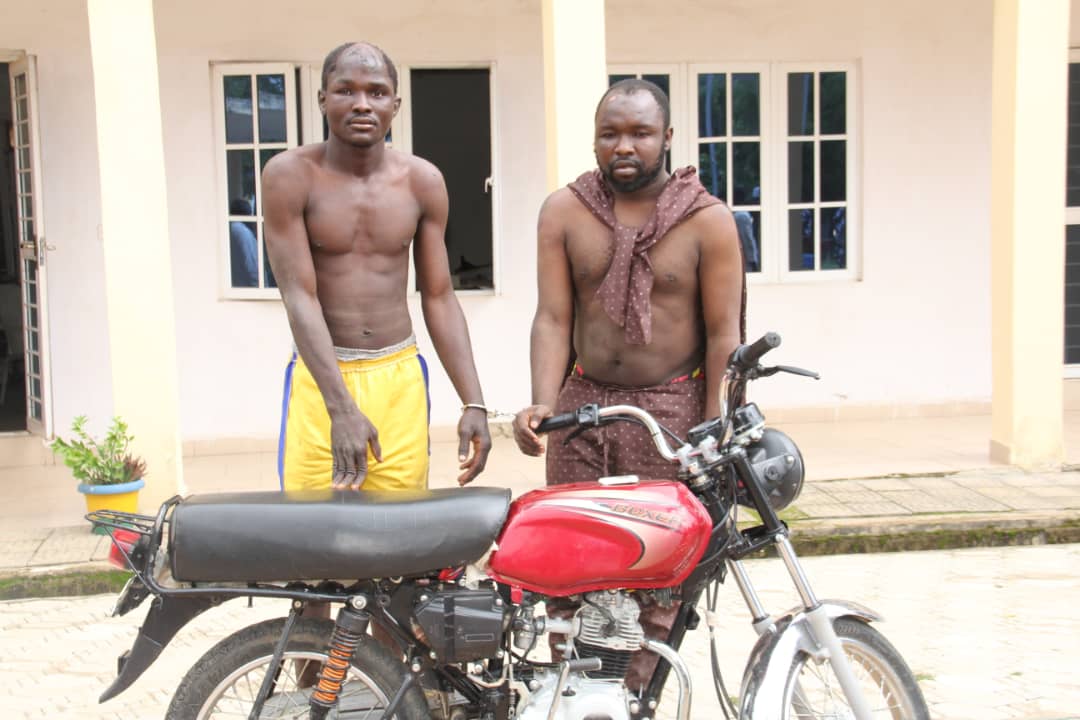




68 Comments